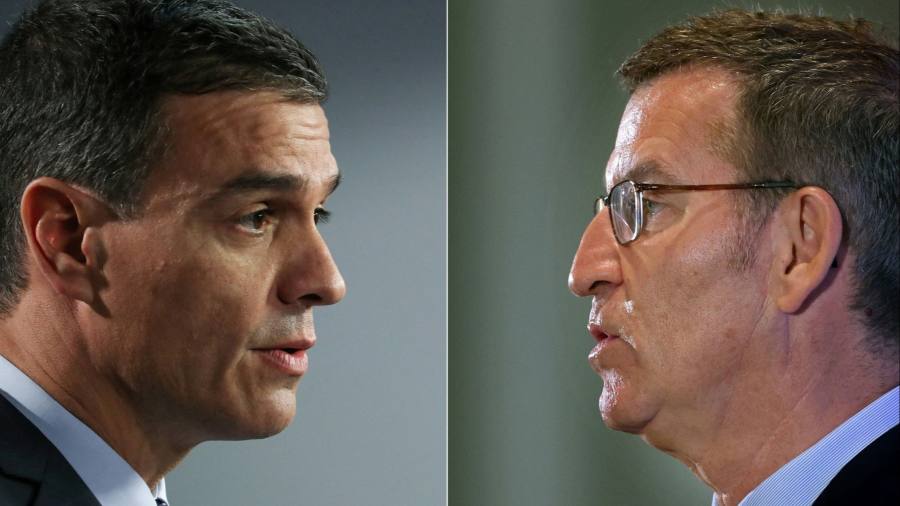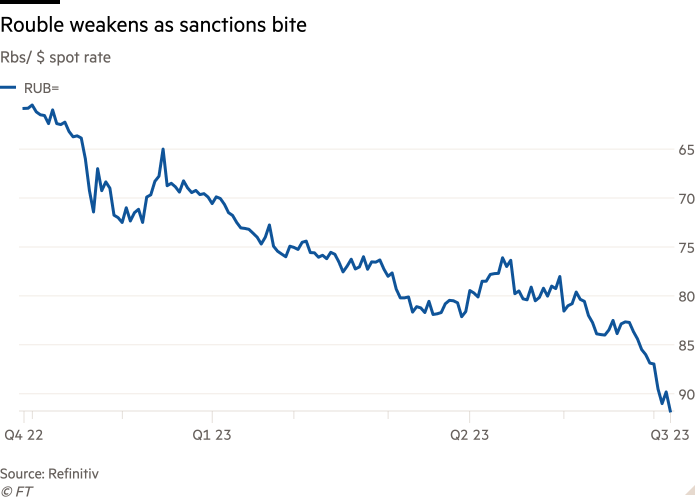
Receive free Spanish politics updates
We’ll send you a myFT Daily Digest email rounding up the latest Spanish politics news every morning.
This article is an on-site version of our Europe Express newsletter. Sign up here to get the newsletter sent straight to your inbox every weekday and Saturday morning
Good morning. First some good news for Ukraine. The EU institutions this morning reached agreement to spend €500mn from the EU budget to increase manufacturing capacity for artillery ammunition and missiles so they can send more to Kyiv to fight Russia.
Today I explain how Spain’s ruling Socialist party is fighting the same battle against green transition foot-draggers at home and in Brussels, and what its likely fall from power later this month could mean for EU climate change legislation. And my Brussels colleagues reveal why the EU wants lorries to be bigger.
Have a great weekend.
Heating up
Spain’s general election this month has thrown into uncertainty the country’s days-old presidency of the EU, as the ruling party tries to push both its European agenda and fight an uphill re-election battle.
But on climate change, they can use the same message: anyone who tells you not to worry is “very stupid”.
Context: Spain assumed the EU council presidency this week, days after the EPP, the bloc’s largest political party, called for a “regulatory pause” on green legislation. At home, the ruling Socialist party is facing defeat to its conservative rival the People’s party (PP), which has said the green transition is happening too abruptly.
“We have seen and we are worried by these statements . . . it’s a very stupid approach,” said one Spanish government official of the EPP and PP positions. “Is climate change also going to pause? . . . We need an approach that searches for solutions rather than denying the facts of the problem.”
That’s an argument that Prime Minister Pedro Sánchez’s party can repeat at home and in Brussels. His government — and other EU capitals that want to see faster work on tackling climate change — are particularly concerned that if PP come to power and the helm of the presidency, they will simply stymie all green legislation files on the EU’s agenda.
Alberto Núñez Feijóo, the PP leader, told the Financial Times last week that renewable energy capacity was not as abundant as Sánchez makes out and that one of his priorities was to make sure Spain had the power to support heavy industry, which would mean delaying the closure of nuclear plants. Asked if he was saying the green transition was happening too quickly, he said: “No. The goal is to make the transition more efficiently.”
Sánchez will also be pressing European Commission president Ursula von der Leyen to stick to her pledge to “reconcile the economy with our planet”, rather than following the EPP call to press pause. Her office has said she did not sign the EPP declaration, but as the party’s most powerful politician, it puts her in an awkward spot.
In Madrid, there’s confidence von der Leyen will hold the line. Less so that Sánchez will be in office long enough to be able to do the same.
Chart du jour: Russian (t) rouble

The rouble has lost a third of its value since December as western sanctions and the impact of Wagner’s aborted insurrection weigh on the Russian currency.
Make trucks great again
The EU wants the bloc to be able to have bigger, heavier trucks because, counter-intuitively, that could be good for fighting climate change, write Alice Hancock and Javier Espinoza.
Context: Electric lorries or those that run on hydrogen will need to be much bigger than allowed under current EU rules to account for the space required for batteries or a hydrogen tank. At the moment, most common trucks may weigh up to 44 tonnes and carry containers of up to 45 feet.
The EU now wants to create the possibility for mega-trucks like those used in the US. New rules will “enable additional loading capacity”, said a draft outlining the changes and seen by the FT.
According to the text, the EU’s haulage infrastructure is too fragmented. The revised legislation will “harmonise rules on the use of longer and/or heavier commercial vehicles in cross-border operations”.
It will also mandate that weighing mechanisms for trucks are built into road infrastructure to prevent overloading. “It is important to ensure that the right truck with the right cargo operates on the right road at the right time as this would help reduce the impact on environment, infrastructure, human health and safety, and society,” the draft said.
The package of measures, due to be presented by the European Commission next week, also aims to address issues for freight companies in booking space on train lines. Rail networks at the moment rely on annual timetables that cause headaches for delivery companies needing to book slots short term.
“Uncoordinated maintenance works on the national networks disrupt traffic more than necessary,” the document also said. The idea is to introduce “a sort of Eurocontrol”, which co-ordinates and monitors air traffic, for rail, said one EU official.
But warned another, “the rail sector is very conservative so it can take a lot to shake them up”.
The commission declined to comment on the draft.
What to watch today
-
Austrian chancellor Karl Nehammer hosts Hungary’s Viktor Orbán and Serbia’s Aleksandar Vučić to discuss migration.
-
G7 justice ministers meet in Tokyo.
Now read these
Recommended newsletters for you
Britain after Brexit — Keep up to date with the latest developments as the UK economy adjusts to life outside the EU. Sign up here
Trade Secrets — A must-read on the changing face of international trade and globalisation. Sign up here
Are you enjoying Europe Express? Sign up here to have it delivered straight to your inbox every workday at 7am CET and on Saturdays at noon CET. Do tell us what you think, we love to hear from you: [email protected]. Keep up with the latest European stories @FT Europe